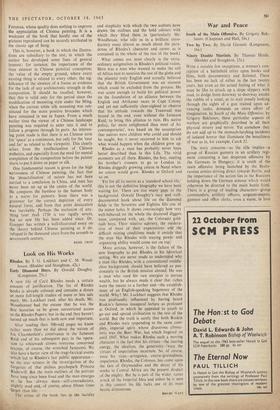Look on His Works
A tvEm life of Cecil Rhodes needs a certain amount of justification. The list of Rhodes books is already colossal and , contains a dozen or more full-length studies of more or less safe merit. Mr. Lockhart (and, after his death, Mr. Woodhouse) had the excuse that he was the first historian to be given unrestricted access to the Rhodes Papers; but in the end.they haven't turned up much that is both new and important.
After 'reading their 500-odd pages we know rather more than we did about the nature of Joe Chamberlain's connivance in the Jameson Raid and of his subsequent part in the opera- tion to whitewash almost everyone concerned (except, of course, the wretched Jameson). We also have a better view of the tragi-farcical events which led to Rhodes's last public appearance— as the .star witness in the investigation of the forgeries of that pitiless psychopath Princess Radziwill. But the main outlines of the portrait have long since been fixed and the man emerges as he has always done—self-contradictory, slightly mad and, of course, about fifteen times larger than life.
The virtue of the book lies in the lucidity and simplicity with which the two authors have drawn the outlines and the bold colours with which they filled them ,in (particularly Mr. Woodhouse, who tells us in a brilliant intro- ductory essay almost as much about the para- doxes of Rhodes's character and career as is contained in the whole of the rest of the book).
What comes out most clearly is the extra- ordinary astigmatism in Rhodes's political vision. Here was a man who wanted to make the soil of Africa (not to mention the rest of the globe and the planets) truly English and actually believed that the British Government was an element which could be excluded from the process. He was acute enough to build his political power on the foundation of an alliance between the English and Afrikaner races in Cape Colony and yet not sufficiently clear-sighted to observe that his attitude towards the Transvaal was bound in the end, even without the Jameson Raid, to bring this alliance to ruin. His native policy, far more enlightened than most of his contemporaries', was based on the assumption that natives were children who could and should be taught, but it never occurred to him to ask what would happen when the children grew up.
Rhodes as a man has probably never been better described than in this Life. The vivid moments are all there. Rhodes, the boy, stealing his brother's trousers to go to London in. Rhodes doggedly growing cotton in Natal where no cotton would grow. Rhodes at Oxford and so on.
Yet for all its merits as a 'standard school life,' this is not the definitive biography we have been waiting for. There are too many gaps in the background. Oswald Doughty's racy and well- documented book about life on the diamond fields in the Seventies and Eighties fills one of the minor holes. It shows convincingly how very well-behaved on the whole the diamond diggers were, compared with, say, the Colorado gold- rush boys. Their relative sobriety, the modera- tion of most of their expectations and the difficult mining conditions made it certain that the man like Rhodes with staying power and organising ability would come out on top.
More serious, however, is the failure of the new biography to put Rhodes in his historical setting. We are never made to understand why a man like Rhodes, with a conventional' middle- class background, should have believed so pas sionately in the British mission abroad. He was .a man who used his vast energies to pursue wealth, but he always made it clear that riches were the means to a further end—the establish- ment of an English-speaking hegemony of the world. Why? Mr. Lockhart suggests that Rhodes was profoundly influenced by having heard Ruskin's famous inaugural lecture as professor at Oxford, in which he appealed to youth to go out and spread civilisation to the rest of the world. But the truth is surely that both Ruskin and Rhodes were responding to the same com- plex, imperial spirit whose disastrous climac- teric was the Boer War, but which lingered on until 1947. What makes Rhodes such a moving character is the fact that his virtues—the roaring energy, the idealism, the generosity-=were the virtues of imperialism incarnate. So, of course, were his vices—arrogance, coarse-grainedness, impatience. Rhodes, the Colossus, has come upon the fate of Ozymandias and the decay of his works in Central Africa are the present despair of the mighty. But he is part of the wider, vaster wreck of the Imperial Idea and unless he is seen in this context his life lacks one of its most heroic dimensions.
DAVID WAIT


































 Previous page
Previous page